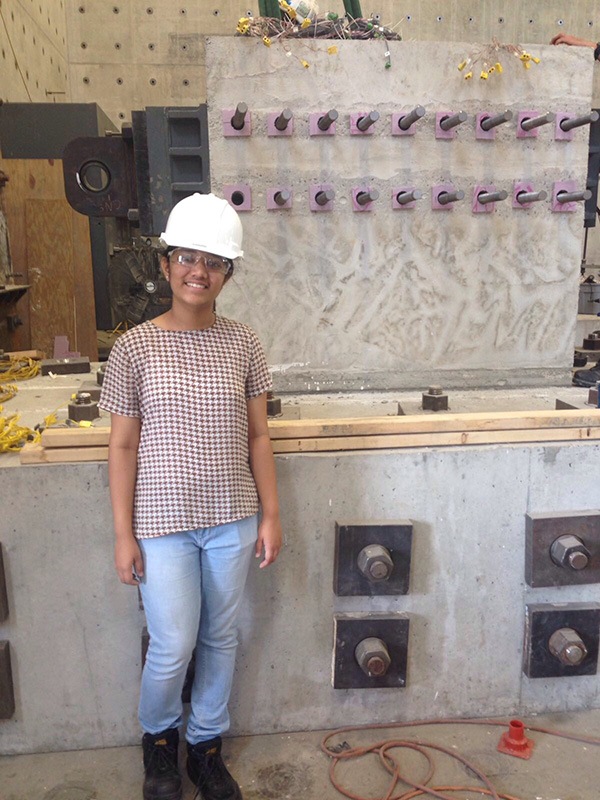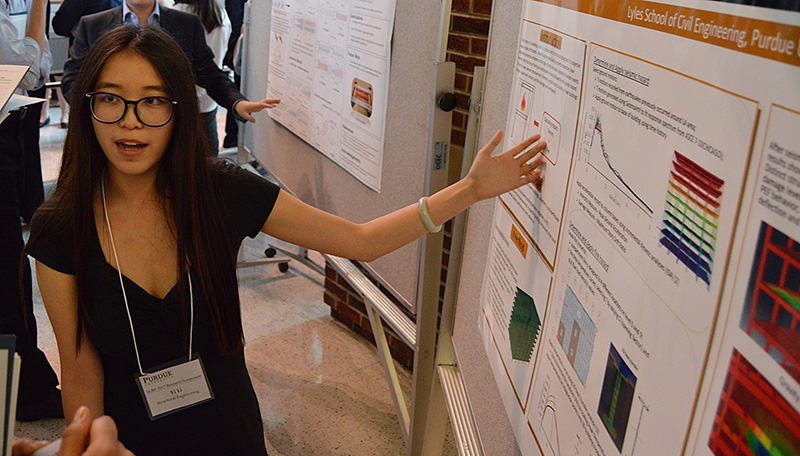Undergraduate research — a top priority
Purdue Civil Engineering strongly supports the belief that one of the best ways for undergrads to truly understand their studies is through hands-on research.
In 2017, the Lyles School of Civil Engineering participated in three programs aimed at giving undergraduates an opportunity to take an active role in ongoing research conducted by our graduate students, faculty and staff. The three programs are Purdue University’s Summer Undergraduate Research Fellowship (SURF), the Purdue Undergraduate Research Experience (PURE) and the S.N. Bose Scholars Program.
"For Purdue Civil Engineering, we believe it is vitally important to expose undergrad students to the many cutting-edge research opportunities available," says Amit Varma, professor of civil engineering and director of the Robert L. and Terry L. Bowen Laboratory. "It's an enriching experience for the undergraduates and for the grad students they work with."

S.N. Bose Scholar Program participant Vrushali Sanjeev Garde assisted in research comparing simple and advanced methods of analysis in American Institute of Steel Construction (AISC) 360 for fire-resistant design.
Varma adds that a major factor in Purdue's success with its undergrad research programs is that the selected students are carefully placed in the fields and research areas that best suit them.
"I'd say 90 percent of success is ensuring students are placed in the right environment," he says. "When their placing is a good fit, they naturally feel more excited and eager to participate, assist researchers and write papers."
In addition to gaining firsthand research experience, participants are paid for their efforts. They also get to attend professional development and research seminars, present their research discoveries, and enjoy networking and social activities with other student researchers.
Civil engineering undergrad Yi Li worked at the Bowen Lab with Rachel Chicchi, a civil engineering PhD student, researching post-earthquake fire assessment of steel buildings.
"She was an incredibly big help for my research; we both learned a lot from each other," Chicchi says. "The work we did continually had her asking questions and finding new answers that she probably never would have considered solely from classroom work."

CE undergrad Yi Li conducted research on post-earthquake fire assessment of steel buildings. SURF participants deliver poster presentations on the work they have done.
Li was grateful for the opportunity to work on a major research project.
"Thanks to SURF, I got to really enhance my understanding of research being done in my field of study, and I gained a lot of additional writing experience," she says. "I felt like I was truly a vital member of the team."
Varma said Li's experience is what all undergrad research program participants strive to achieve. "These programs' greatest function is to demonstrate to students where the classroom knowledge is coming from," he says. "It shows that the equations and examples they study in class actually come from somewhere — they are not made up — and they have very practical applications."
For more information about Purdue’s undergraduate research programs, visit purdue.edu/research/ugrad.
